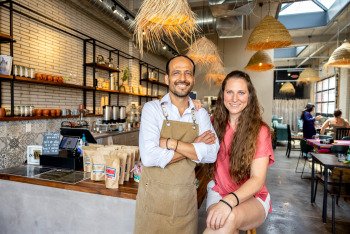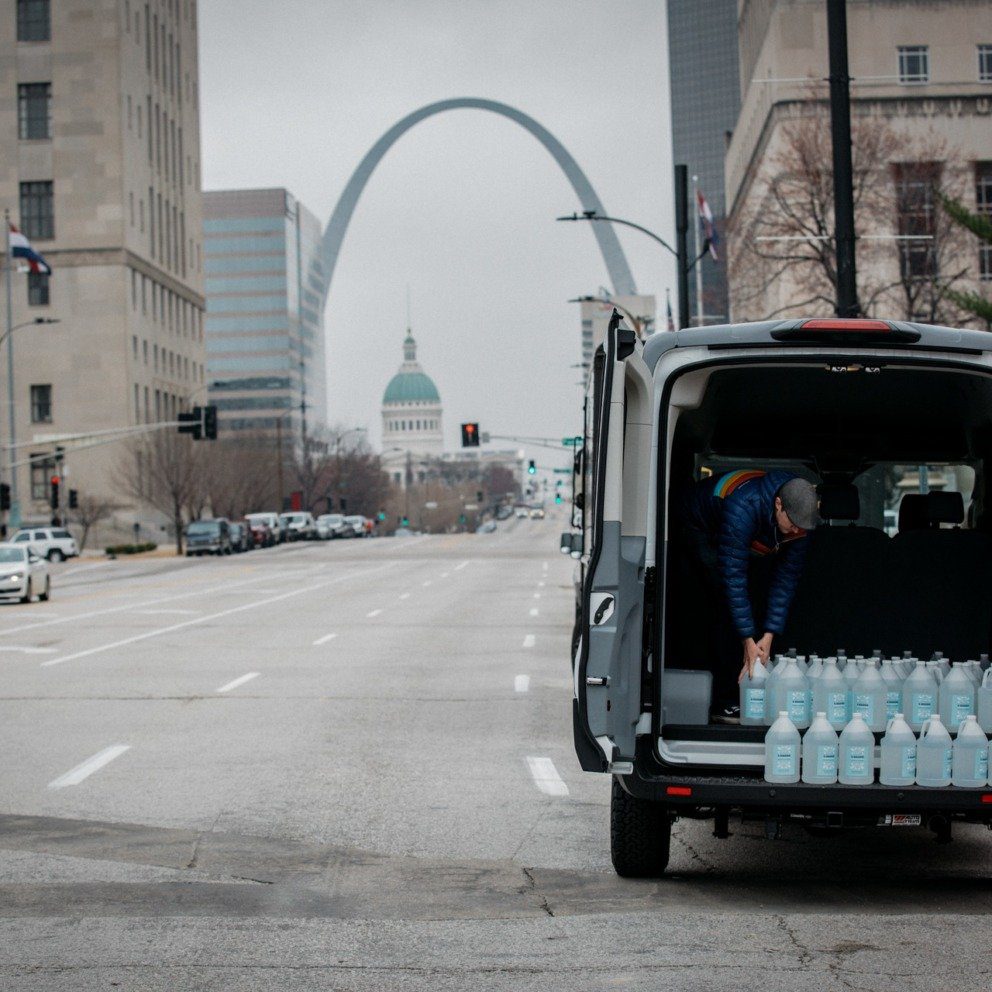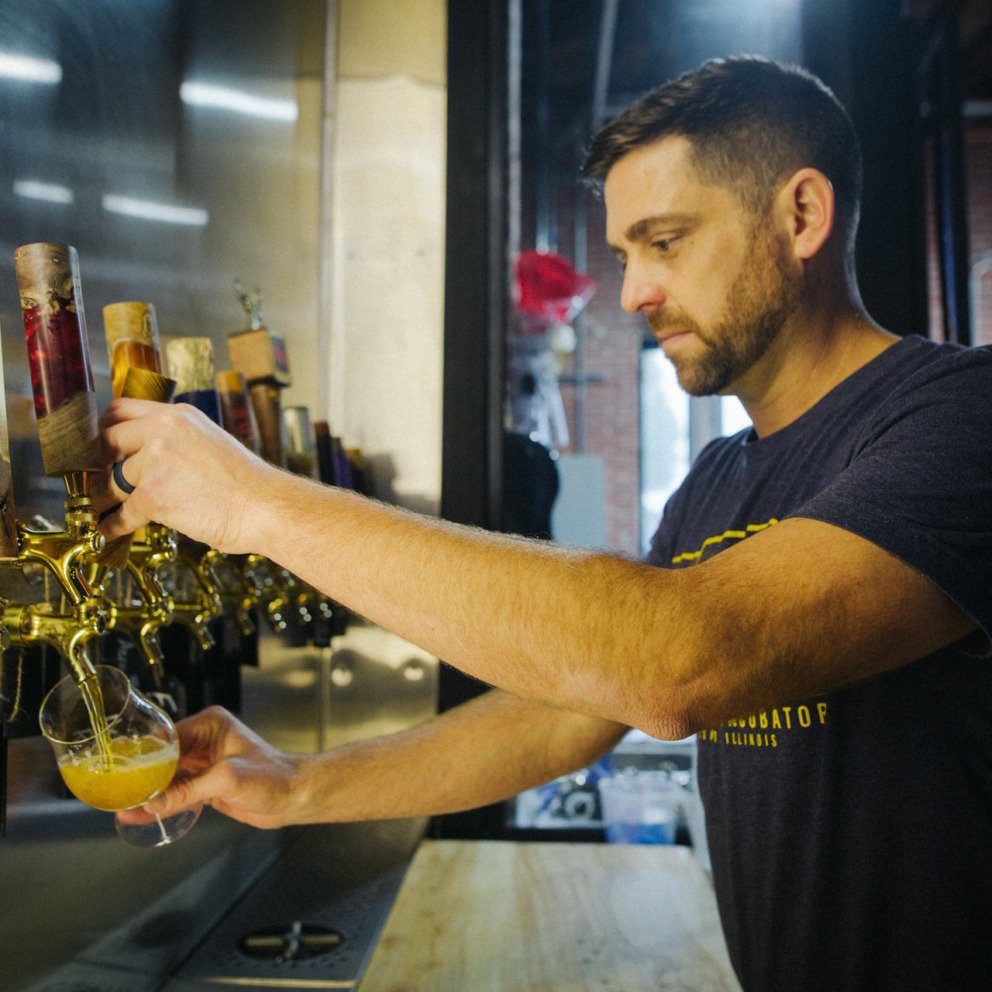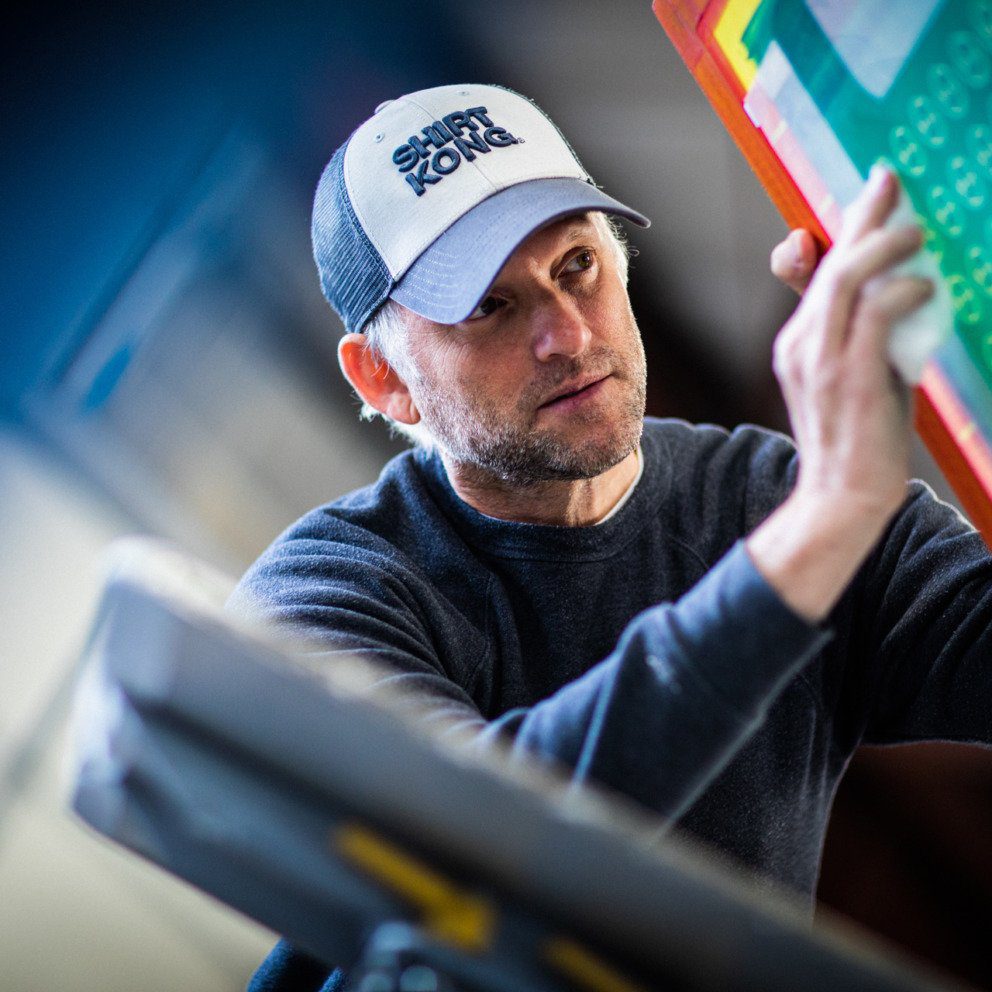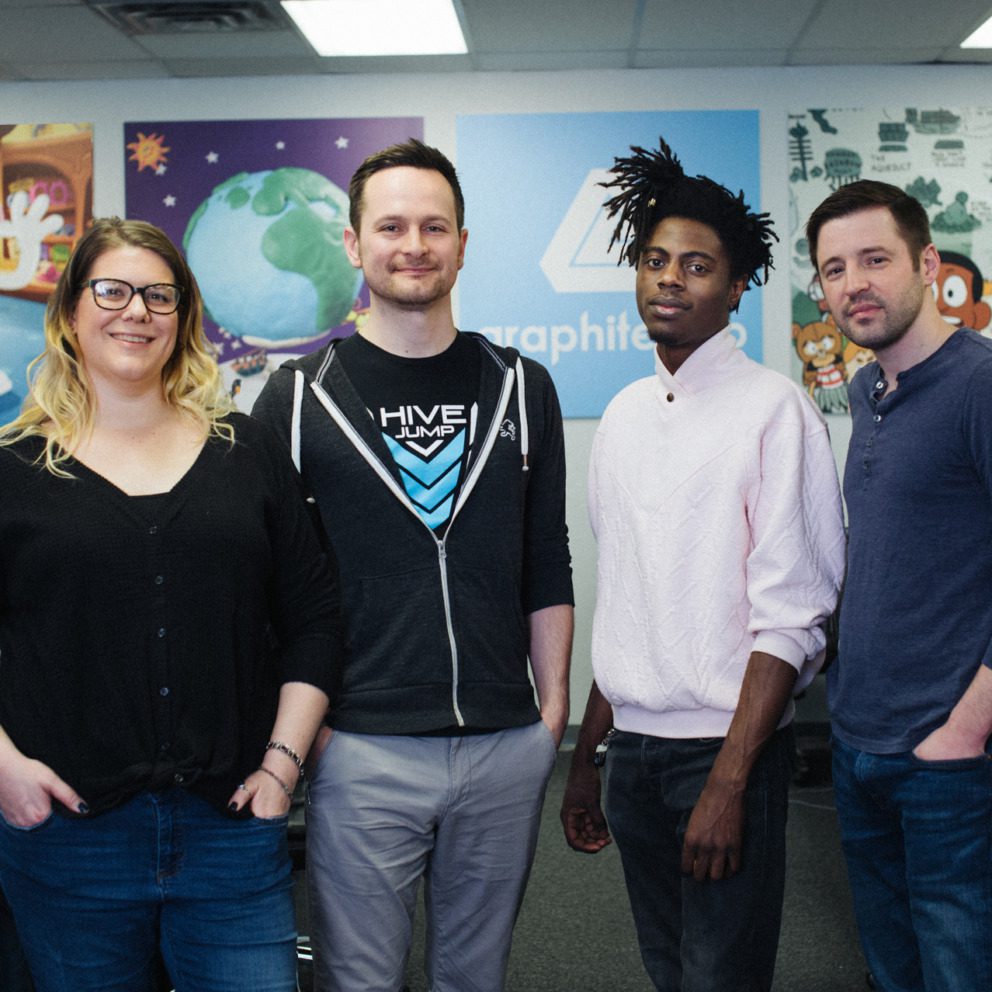Brewing Community
St. Louis brewers find new ways to connect with beer lovers and continue their businesses during the pandemic.
This story is the second in a series about the St. Louis brewing community. Read the first story here.
Hops, water, yeast, grain. A simple recipe. But what results is more than just a golden-colored alcoholic beverage. Brewers are passionate about perfecting their products, and craft beer consumers are passionate about supporting them—even during a pandemic.
While the 75-plus breweries in the St. Louis area closed their beer halls and tasting rooms in March, they haven’t shut down. They’re figuring out different ways to bring their brews to consumers, foster the sense of togetherness that comes from sharing a pint or a flight, and keep their employees on the payroll. Some have begun to open their tasting rooms again and even expand their offerings.
“What each of these breweries are doing is creating community,” says Troika Brodsky, executive director of the St. Louis Brewers Heritage Foundation. “Breweries are really a key part of driving a local economy. They’re not just making a product that they’re selling; they’re employing people, creating jobs, working with different partners. They connect to every part of the city.”
Weathering Challenges at Millpond Brewing
During the pandemic, that focus on connecting to the community has meant adapting operations for both established and newly minted breweries. Millpond Brewery and Incubator in Millstadt, Illinois, had only been open for five months when Illinois Governor J.B. Pritzker ordered all restaurants and bars in the state to temporarily close. Owner Bryan Schubert had to close his tasting room and beer garden and act fast in order to keep operations afloat.
Up until that point, Millpond had only sold beer to-go in growlers. Within hours of Pritzker’s mandate, Schubert procured a single-head can seamer, a pallet of cans and other packaging supplies from friends at Main & Mill Brewing Co. in Festus, Missouri. “The day after Pritzker’s announcement, my father and I found a box truck and headed down to Festus,” Schubert says. “The Main & Mill owners were nice enough to loan us that seamer, which we still use today. By that evening, we were selling cans to-go out of the brewery.”
A long-time homebrewer, Schubert opened Millpond inside a former auto shop, which had to be stripped down to the studs and rebuilt. The work was worth it for Schubert, who oversaw the renovation with friends and family, to bring a new gathering space to his hometown.
“Back when villages like Millstadt had a mill, the mill pond was the source of power for the mill, and those mill ponds were essentially the first city parks,” Schubert says. “So it was definitely a community gathering place.”
The pandemic has changed his business, Schubert says, but it hasn’t halted his creativity or love for craft beer. On July 17, just a few weeks after reopening the tasting room, Millpond released Gose Crazy Folks, a tart, kettle-soured Gose made with black cherries.
“It has Cardinal hops in it, and the name is a reference to Jack Buck’s call in the 1985 National League Championship Series, when Ozzie Smith hit the home run down the right field line and Jack yelled, ‘Go crazy folks! Go crazy!’” Schubert says. “We’re really, really happy with where it’s at and we’re really excited about the feedback we’ve gotten from our customers so far.”
Gose Crazy Folks was released on draft in the tasting room as well as in cans, and during the first weekend it was available, Schubert says a little more than 50 percent of the beer was sold. For Schubert, that doesn’t just mean that he’s brewed a great beer — it also means his community is showing up to support his dream of creating a neighborhood gathering place.
“I can’t stress enough how happy we are to have the tap room back open and to be able to have people come in and enjoy our space,” Schubert says. “Yes, it does come with some extra restrictions, but we’re happy to be able to do that, because we want to share the building that we built. First and foremost, we built the brewery on the idea of people being able to come in and share our beautiful building and to be able to sit inside and have some beer on draft with their friends.”
Community-Fueled Growth at Six Mile Bridge
That same focus on creating community inspired Lindsay and Ryan Sherring to move from Cape Town, South Africa, to St. Louis with the goal of starting their own brewery. The Sherrings opened Six Mile Bridge in Maryland Heights in 2015, and ran into some challenges early on; Lindsay says, “When we started here at Six Mile Bridge, nobody really knew who we were, so we weren’t able to capture a lot of people from the brewing industry because we were just these new kids on the block.” But they were pleasantly surprised by how the St. Louis beer community welcomed and embraced their brewery. “We found that people were way more open to working with us and helping us along,” Lindsay says. “I think that accelerated our growth. I think the community really helped us get to where we are.”
Six Mile Bridge’s success fueled its recent expansion, which doubled the footprint of the tap room and outdoor patio and added a kitchen serving food developed by chef Trey Quinlan. The debut menu features some classic pub fare, including wings and sandwiches, as well as creative dishes including the Oak Meadow Farms’ Pork Burger made with pork from a farm that feeds its pigs spent grain from Six Mile Bridge.
After months of keeping the doors closed during the pandemic and selling beer curbside, the space reopened with limited capacity on June 16. Tables are spaced six feet apart to adhere to social distancing guidelines and stringent sanitation measures have been put in place, plus, employees are required to wear face masks inside the tasting room. So far the Sherrings say the response has been extremely positive. “At the end of the day, this is why we’re doing it, and it’s working,” Lindsay says with pride.
The brewery’s success has also allowed the Sherrings to give back to the community they love; every year, they brew a Belgium wheat beer and add 504 pounds of cranberries to it, coloring it pink. For this release, they partner with Gateway to Hope in Missouri, donating a huge portion of the proceeds to the breast cancer support organization. Lindsay says, “They just do incredible work in the community, and it’s nice to be able to give to an organization that is helping real women who are in St. Louis right now undergoing breast cancer treatment.”
Giving Back at 4 Hands Brewing Co.
One of the largest craft breweries in St. Louis has also found unique ways to give back to its community. 4 Hands Brewing Co., opened by Kevin Lemp just a few blocks from Busch Stadium in 2011, donates $1 of every case of its City Wide beer. “We choose a new nonprofit every quarter, and 100 percent of those nonprofits have been based in the city,” Lemp says.
4 Hands has also branched out from brewing beer to distilling gin and creating canned cocktails through their 1220 Spirits line. In 2019, 4 Hands’ business grew eight percent, including 44 employees; and has just over $10 million in revenue. Lemp says of the success, “we’re driving traffic into the city, which those customers are spending money in the city where maybe before they weren’t coming here and not just for ball games, but on a Wednesday, Tuesday and Monday.”
During the early days of the pandemic in St. Louis, 4 Hands stepped up again for its community, diverting raw distilling ingredients to make hand sanitizer. The brewery closed on-premise operations in March and installed a walk-up window to sell cans curbside, an element of the new business that Lemp hopes to keep in place whatever the future brings.
4 Hands has also come up with some creative ideas for drawing people to the brewery for curbside pick-up, like partnering with The Pageant to develop a special edition crowler dedicated to St. Louis artist Marquise Knox and offering CDs signed by Knox for pick-up to help promote Knox’s live stream event with the Pageant. They’ve also set up outdoor tents with distanced Adirondack chairs for those who want to enjoy their beer, canned cocktails or seltzer sno-cones someplace that’s not their backyard.
Finding New Ways to Foster Community at Hop Shop
Although a walk-up window wasn’t in the cards for craft-beer bar and bottleshop Saint Louis Hop Shop, owners Justin Harris and Ryan Griffin say they’ve been overwhelmed by the community response to the shop’s pivot during the pandemic. Early in March, even before local government issued orders to temporarily close restaurants and bars, Harris and Griffin opted to shut down the bar at their Cherokee Street shop and set up an online eCommerce store to keep their business going.
Since shifting to an online ordering and curbside pickup model in March, the bottle shop has seen steady business. Harris says he and Griffin miss the in-person customer service element of their business the most — chatting with shoppers about beer styles, new releases and different breweries — but for now, curbside pickup still feels safest for them and their customers.
“95 percent of our business was dealing directly with customers,” Harris says. “We really took pride in sharing our knowledge about the products that we carry with our customers.”
Looking toward the future, Harris says he isn’t sure when Saint Louis Hop Shop will reopen for business as usual, or if business as usual will ever really resume. Like brewery and bottle-shop owners across the St. Louis area, he and Griffin are focused on what they do know and what they can control: Finding new ways to engage with their customers and foster community wherever and however they can best make an impact.
“I think we are looking at more of a new normal than we actually recognize — I don’t think things are going to just completely go back to how they were,” Harris says. “And so we’re trying to put practices in place that will better support how people’s shopping behaviors are changing.”
In a time when small pleasures are a large part of getting through the day-to-day of economic and public health uncertainty, having your favorite seasonal beer can be a source of joy. Harris doesn’t think people’s desire for that is going anywhere, even if it’s picked up from a to-go order.
“I think beer is an extremely communal product,” says Harris. “It does add a level of normalcy to everything going on right now.”
Join the Story
Learn about St. Louis’ history as a beer town and stay up-to-date on what’s happening in the St. Louis-area beer scene by visiting the St. Louis Brewers Heritage Foundation website.


